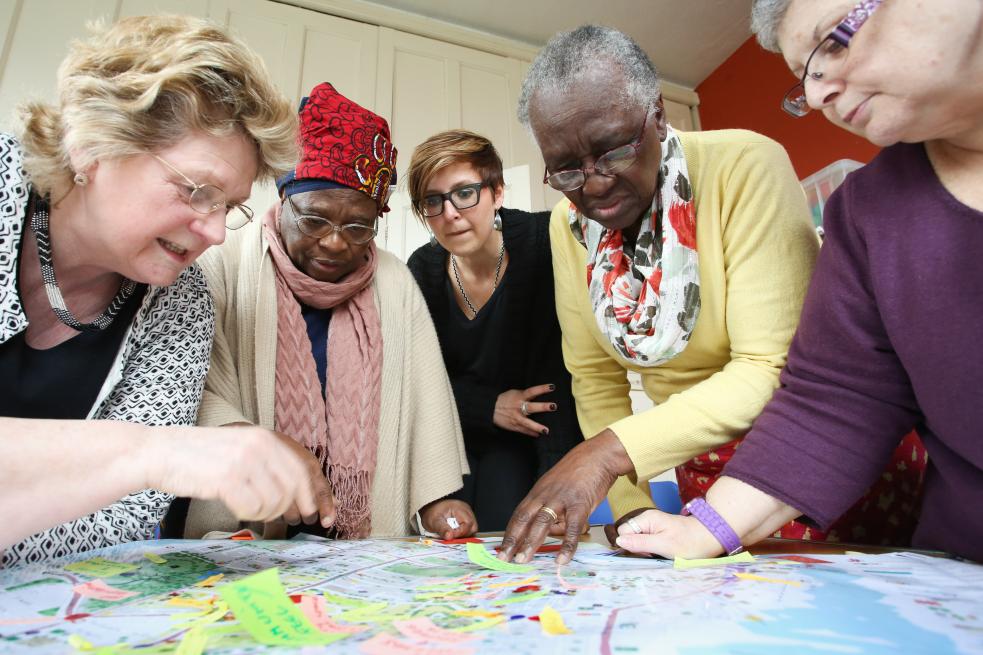Researching Age-friendly Neighbourhoods
Collaborating with older people to explore, research and address issues relating to the age-friendliness of their neighbourhoods in Manchester.

Winner at the NCCPE Engage Awards 2016 in the Working in Partnership category.
This project involved older people in Greater Manchester as co-researchers. It was they who led this study designed to improve the quality of life in low income communities.
They were trained as co-researchers and played a leading role in the key sections of the research – from design through to implementation and analysis.
The project led to tangible outcomes – such as the return of a much-loved local bus service – and was supported by Manchester City Council in its efforts to promote ‘age-friendly’ communities.
This video provides a good summary of the project:
Project partners
Organisations...
- University of Manchester
- Manchester City Council - Age-friendly Manchester
- Whalley Range Community Group
- Chorlton Good Neighbours
- Manchester Institute for Collaborative Research on Ageing (MICRA)
People…
- Tine Buffel – Research Fellow, University of Manchester
- Paul McGarry – Manchester City Council (for Age Friendly Manchester)
- Jo Garsden and Rebecca Bromley – Manchester Institute for Collaborative Research on Ageing (MICRA)
- Chris Ricard – Whalley Range Community Forum
- Helen Hibberd – Chorlton Good Neighbours
- Bill Williams – Age Friendly Whalley Range
Purpose
The project’s aims were to:
- Identify the issues older residents and community stakeholders view as important in developing the ‘age-friendliness’ of their neighbourhood
- Work with older people as co-researchers in the development and implementation of the study
- Promote evidence-based policy making and practice at the local level
- Improve the quality of life in low income neighbourhoods
Background
By 2030, two-thirds of the world's population will reside in cities, with at least one-quarter of their populations aged 60 and over.Developing ‘age-friendly’ cities has thus become a significant issue for public policy.
The World Health Organization's 'Age-Friendly Cities' programme emphasizes the need to develop supportive environments for older citizens. The rationale for this project builds on the WHO’s aspiration to prioritise the central role of older people in improving the age-friendliness of their neighbourhoods.
Approach
The project took a partnership approach across various agencies such as the University, council and community groups.
Eighteen older co-researchers were recruited who were each experiencing isolation, poverty and/or health problems. They interviewed 68 people across three neighbourhoods in Manchester about their needs.
The co-researchers took a lead role in delivering, developing and disseminating the research. They were given training to ensure they understood the different phases and techniques involved.
Throughout the project the co-researchers along with participants took part in a range of public engagement activities – from coffee mornings to formal steering groups and social gatherings out in the neighbourhoods.
A mapping exercise was conducted in which participants explored the opportunities and constraints of ageing in and around Manchester.
Evaluation
Evaluation was carried out through a series of audio-recorded ‘reflection meetings’ with the older co-researchers. The aim of which was to discuss and analyse issues raised in the development of their research programme.
The co-researchers produced a guide to the work they did and the benefits of participation and of the research interview process.
The evaluation highlighted a number of opportunities, including:
- A sense of ‘ownership’ of the study reported by the groups involved, this encouraging participation and advocacy of the rights of older citizens
- counteracting stereotypes of older people by emphasizing and making their involvement and participation visible;
- working with organisations to disseminate research findings and improve their practices.
The evaluation also highlighted the need for interdisciplinary and inter-sectoral partnerships to improve the quality of life in cities. Such collaborations have been crucial in securing additional University impact funding, e.g. to support a project working with community residents to imagine ‘age-friendly communities for all ages’, using a range of visual art and heritage practices.
Lessons learned
Age-friendly neighbourhoods…
- Should provide a mechanism for empowering older people and ensuring social participation in its broadest sense;
- Affirm the importance of recognising the varied dimensions – social as well as physical – which comprise an age- friendly environment;
- Are a reminder about the ‘rights’ of urban citizens (of all generations) to full and active use of the resources of the city.
The research provided insights into how these principles can be implemented. Although the results of this project are promising, further research using similar approaches are needed to test whether these results would be replicated in other settings.
Legacy
- Co-researchers continue to be active in applying for funding and seeking further age-friendly developments;
- Tangible developments have been made, such as the return of a valued bus service, after lobbying by the co-researchers;
- Older people are pro-actively offering solutions to challenges around the ageing agenda in their communities;
- The University of Manchester is now established as a leading centre for research into population ageing and urbanisation.
Contact
For further information, please see the University of Manchester's website, contact Tine Buffel, or listen to our interview with the project team.

